Anti-Merkozy Front is Growing in EU
Adelina Marini, February 22, 2012
 In the past almost two years nearly every important EU summit was preceded by a mini summit between German Chancellor Angela Merkel and French President Nicolas Sarkozy. In fact, the summits between the leaders of France and Germany are a tradition from the very creation of the European Union because it was the post-war agreement between the two countries that is the foundation of the union, but in the last two years, ever since a solution to the eurozone debt crisis is being sought, the summits between Paris and London end up with concrete decisions, which then become a basis for the discussions of the 27. Until recently, starting with the Deauville summit in 2010, all Franco-German ideas were related to budget austerity and spending cuts for the sake of reducing huge indebtedness.
In the past almost two years nearly every important EU summit was preceded by a mini summit between German Chancellor Angela Merkel and French President Nicolas Sarkozy. In fact, the summits between the leaders of France and Germany are a tradition from the very creation of the European Union because it was the post-war agreement between the two countries that is the foundation of the union, but in the last two years, ever since a solution to the eurozone debt crisis is being sought, the summits between Paris and London end up with concrete decisions, which then become a basis for the discussions of the 27. Until recently, starting with the Deauville summit in 2010, all Franco-German ideas were related to budget austerity and spending cuts for the sake of reducing huge indebtedness.
The words "growth" and "employment" were still present only in Jose Manuel Barroso's lexicon. In the beginning of this year, however, on the eve of the first for the year European Council on January 30, the "Merkozy" tandem came up with a surprising proposal for the creation of a growth pact, consisting of 6 measures, among which very important are two elements: the demand for tax coordination and some delays for some of the rules under the new global framework for capital requirements of banks, known as Basel III, in order not to hamper the lending capacity of the banks and therefore to harm economic growth. Please pay attention to the latter because it will be mentioned again in a while. The other measures in the Franco-German proposal are related to facilitating credit access for small and medium-sized enterprises, harnessing the EU structural funds to boost growth, modernising public administration.
The conclusions from the January council were more than general and wishful and created the impression that they were just aimed at taking the steam off to the whistle, because the criticism against budget discipline under the lead of Germany mainly had started to reach threatening scale.
The letter of the Twelve
As a preemptive move, before any new Franco-German summits for the Spring  European Council on March 1-2, 12 EU member states signed a letter, calling for a plan for growth for Europe. Who are the countries is of special importance for the essence of the letter: Britain, the Netherlands, Italy, Estonia, Latvia, Finland, Ireland, the Czech Republic, Slovakia, Spain, Sweden, Poland. What unites these countries since not all of them are part of the eurozone? Unites them the fact that the 12 have contributions of their own for boosting their economies, for the successful overcoming of the grave consequences of the crisis and it could also be said that in general these are countries with opinion. Especially impressing is the participation of David Cameron, Britain's PM, in the initiative, as well that of his Italian colleague Mario Monti.
European Council on March 1-2, 12 EU member states signed a letter, calling for a plan for growth for Europe. Who are the countries is of special importance for the essence of the letter: Britain, the Netherlands, Italy, Estonia, Latvia, Finland, Ireland, the Czech Republic, Slovakia, Spain, Sweden, Poland. What unites these countries since not all of them are part of the eurozone? Unites them the fact that the 12 have contributions of their own for boosting their economies, for the successful overcoming of the grave consequences of the crisis and it could also be said that in general these are countries with opinion. Especially impressing is the participation of David Cameron, Britain's PM, in the initiative, as well that of his Italian colleague Mario Monti.
 It would probably not be too much to suggest that it is the two men actually that have initiated the letter, given that they met on January 18 in London and spoke predominantly about Europe's economic situation, the lack of measures for economic growth and about Italy's efforts to put its finances back on track. And Mario Monti, for his part, is emerging as the third pillar of European governance with a focus on growth measures and the single market. It is the single market that is the common ground between him and Cameron, who experienced severe blows since December onwards, when he refused to put his signature
It would probably not be too much to suggest that it is the two men actually that have initiated the letter, given that they met on January 18 in London and spoke predominantly about Europe's economic situation, the lack of measures for economic growth and about Italy's efforts to put its finances back on track. And Mario Monti, for his part, is emerging as the third pillar of European governance with a focus on growth measures and the single market. It is the single market that is the common ground between him and Cameron, who experienced severe blows since December onwards, when he refused to put his signature  below the fiscal compact and thus was pushed aside by the Franco-German tandem to the periphery of Europe's governance. Something, which he refuses to accept but he obviously needs strong allies to help him return on European stage, precisely with what is closest to his heart - the single market.
below the fiscal compact and thus was pushed aside by the Franco-German tandem to the periphery of Europe's governance. Something, which he refuses to accept but he obviously needs strong allies to help him return on European stage, precisely with what is closest to his heart - the single market.
The letter contains 8 points, but none of them is new in essence. The very text of the letter is an appeal for returning where the deepening of integration actually started from - the single market - more than 20 years ago. In the eight points are practically  outlined those elements of the internal market which are still not entirely liberalised and are victims of national protectionism. This is why it is quite natural among the first points to be the call for a full implementation of the services directive, which yet with its adoption caused division in Europe but was a serious breakthrough, although its real application remained voluntary. As with many other European policies. The signatories of the letter recall that the services sector already takes four fifths of the European economy but the market of services is not sufficiently open.
outlined those elements of the internal market which are still not entirely liberalised and are victims of national protectionism. This is why it is quite natural among the first points to be the call for a full implementation of the services directive, which yet with its adoption caused division in Europe but was a serious breakthrough, although its real application remained voluntary. As with many other European policies. The signatories of the letter recall that the services sector already takes four fifths of the European economy but the market of services is not sufficiently open.
"We must act with urgency, nationally and at the European level, to remove the 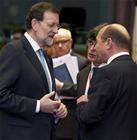 restrictions that hinder access and competition and to raise standards of implementation and enforcement to achieve mutual recognition across the single market", the letter says. As next the 12 premiers put the creation of a real digital market by 2015, as is the ambition of the European institutions. The idea is a fully fledged online trade to be developed, which requires the appropriate relief of trans border trade and unification of the copy rights regimes. Their third proposal is quite surprising given the current state of play and the only way it can be explained is with indeed the building up of a front of EU member states who are fed up with the adoption of EU solutions, which then the big and influential countries find reasons not to apply.
restrictions that hinder access and competition and to raise standards of implementation and enforcement to achieve mutual recognition across the single market", the letter says. As next the 12 premiers put the creation of a real digital market by 2015, as is the ambition of the European institutions. The idea is a fully fledged online trade to be developed, which requires the appropriate relief of trans border trade and unification of the copy rights regimes. Their third proposal is quite surprising given the current state of play and the only way it can be explained is with indeed the building up of a front of EU member states who are fed up with the adoption of EU solutions, which then the big and influential countries find reasons not to apply.
 Such is the case with the third proposal of the Twelve, which is in fact an appeal for the building of a "genuine, efficient and effective internal market in energy by 2014". It is called all member states to apply entirely the Third Energy Package in the agreed deadlines. Obviously this call is a reaction to the attempts of some countries, Berlusconi's Italy among them, for a selective application of the package because of agreed concessions with Russia, which calls at every EU-Russia summit for mitigation of the conditions in the Third Energy Package, a major element of which is breaking up of ownership. In other words - separation of sales and production from transition grids.
Such is the case with the third proposal of the Twelve, which is in fact an appeal for the building of a "genuine, efficient and effective internal market in energy by 2014". It is called all member states to apply entirely the Third Energy Package in the agreed deadlines. Obviously this call is a reaction to the attempts of some countries, Berlusconi's Italy among them, for a selective application of the package because of agreed concessions with Russia, which calls at every EU-Russia summit for mitigation of the conditions in the Third Energy Package, a major element of which is breaking up of ownership. In other words - separation of sales and production from transition grids.
Germany too maintains warm energy relations with Russia, symbolised by their joint project Nord Stream. And Ms Merkel even said that Germany had never maintained the philosophy, imposed by the European Commission, for a separation of ownership over the transport infrastructure from the product being transported. The package was proposed in 2007 and approved by the European Parliament and the Council in 2009. It is in force as of 3rd of September 2009 - the year when half of Europe remained without natural gas because of a conflict between Russia, the supplier, and Ukraine, a transiting country.
The presence of the prime ministers of Latvia, Estonia, the Czech Republic, 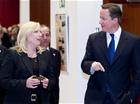 Slovakia and Poland under the letter inclines to thinking that these countries insisted the most for the inclusion of this appeal.
Slovakia and Poland under the letter inclines to thinking that these countries insisted the most for the inclusion of this appeal.
Among the other proposals are also assisting innovative start-ups, creating venture capital funds, signing trade agreements with the main strategic partners of the EU - a proposal where we can recognise Britain's interests. London's handwriting can be recognised also in the calls for reducing European regulation. And here there is a very specific demand, which is probably a result of the lobbying of the new member states for additional opening of the labour market: the Commission to convene "without delay" a new forum for a mutual assessment of national practises, the purpose of which would be to identify the barriers and to undertake common standards for mutual recognition of professional qualifications.
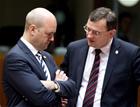 This demand is very timely, given that there are still member states who left up to the very last moment in force their restrictions for workers of the new member states, in order to protect their labour markets. The issue is extremely sensitive at the moment, because in many member states there is high and growing unemployment, especially among the young people. According to the authors of the letter, however, the problem would not be solved via closing national labour markets. It is evident that this would be a very difficult mission, taking into account that already it is leading to extremes in some
This demand is very timely, given that there are still member states who left up to the very last moment in force their restrictions for workers of the new member states, in order to protect their labour markets. The issue is extremely sensitive at the moment, because in many member states there is high and growing unemployment, especially among the young people. According to the authors of the letter, however, the problem would not be solved via closing national labour markets. It is evident that this would be a very difficult mission, taking into account that already it is leading to extremes in some 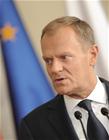 countries as is the case with the nationalist Freedom Party in the Netherlands, which has launched a hotline, calling the Dutch to report cases of taken from them jobs to the benefit of citizens of Central and Eastern Europe.
countries as is the case with the nationalist Freedom Party in the Netherlands, which has launched a hotline, calling the Dutch to report cases of taken from them jobs to the benefit of citizens of Central and Eastern Europe.
In the end of the letter is formulated the demand that most clearly described the letter as a growing anti Franco-German front. "While pursuing a level playing field globally, we should commit  irrevocably to international binding standards for capital, liquidity and leverage with no dilution, ensuring that EU legislation adheres to Basel 3 standards to ensure financial stability and meet the financing needs of our economies". This paragraph is a direct response to the quite vague articulation in the proposal of France and Germany from end-January, mentioned above.
irrevocably to international binding standards for capital, liquidity and leverage with no dilution, ensuring that EU legislation adheres to Basel 3 standards to ensure financial stability and meet the financing needs of our economies". This paragraph is a direct response to the quite vague articulation in the proposal of France and Germany from end-January, mentioned above.
The letter of the Twelve is addressed to the EU leaders - Herman Van Rompuy and Jose Manuel Barroso - but it is explicitly mentioned that copies had been sent to the other member states. The challenge comes only days before the Spring European Council on March 1-2 and promises to make it a very interesting one.
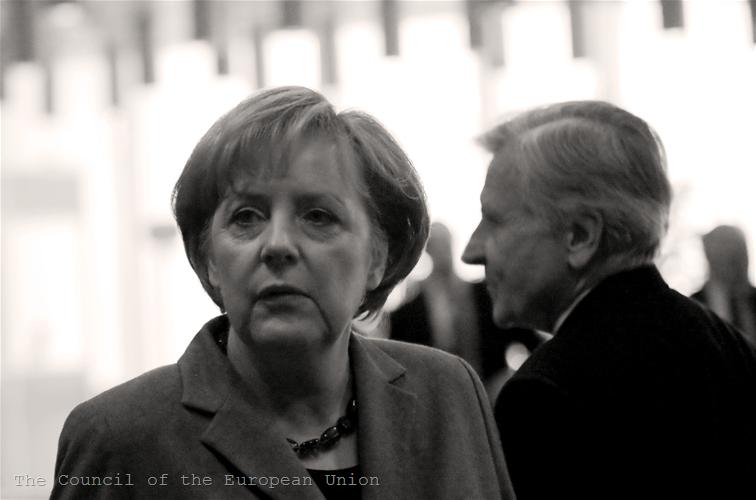 | © The Council of the European Union
| © The Council of the European Union | © The Council of the European Union
| © The Council of the European Union Klaus Regling | © Council of the EU
Klaus Regling | © Council of the EU Mario Centeno | © Council of the EU
Mario Centeno | © Council of the EU Mario Centeno | © Council of the EU
Mario Centeno | © Council of the EU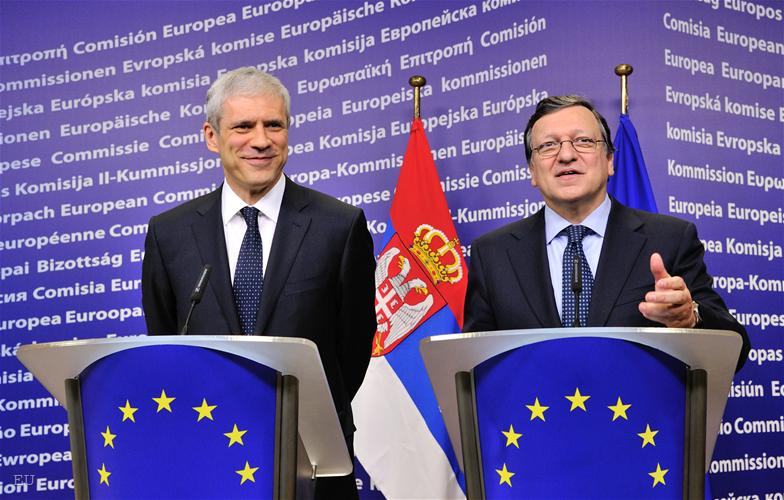 | © EU
| © EU